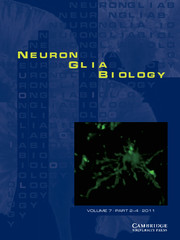Crossref Citations
This article has been cited by the following publications. This list is generated based on data provided by
Crossref.
Kimelberg, Harold K.
and
Nedergaard, Maiken
2010.
Functions of Astrocytes and their Potential As Therapeutic Targets.
Neurotherapeutics,
Vol. 7,
Issue. 4,
p.
338.
Kimelberg, Harold K.
2010.
Functions of Mature Mammalian Astrocytes: A Current View.
The Neuroscientist,
Vol. 16,
Issue. 1,
p.
79.
Reichenbach, Andreas
Derouiche, Amin
and
Kirchhoff, Frank
2010.
Morphology and dynamics of perisynaptic glia.
Brain Research Reviews,
Vol. 63,
Issue. 1-2,
p.
11.
Xu, Guangjin
Wang, Wei
Kimelberg, Harold K.
and
Zhou, Min
2010.
Electrical coupling of astrocytes in rat hippocampal slices under physiological and simulated ischemic conditions.
Glia,
Vol. 58,
Issue. 4,
p.
481.
Xie, Minjie
Yi, Chenju
Luo, Xiang
Xu, Shabei
Yu, Zhiyuan
Tang, Yingxin
Zhu, Wenhao
Du, Yixing
Jia, Lintao
Zhang, Qiang
Dong, Qiang
Zhu, Wenzhen
Zhang, Xia
Bu, Bitao
and
Wang, Wei
2011.
Glial gap junctional communication involvement in hippocampal damage after middle cerebral artery occlusion.
Annals of Neurology,
Vol. 70,
Issue. 1,
p.
121.
Unsworth, Charles P.
Holloway, Hilary
Delivopoulos, Evangelos
Murray, Alan F.
Simpson, Miriam C.
Dickinson, Michelle E.
and
Graham, Euan S.
2011.
Patterning and detailed study of human hNT astrocytes on parylene-C/silicon dioxide substrates to the single cell level.
Biomaterials,
Vol. 32,
Issue. 27,
p.
6541.
Kimelberg, Harold
2011.
Astrocytes.
Vol. 20112381,
Issue. ,
p.
3.
Jacobs, Shelley
Cheng, Connie
and
Doering, Laurie C.
2012.
Modeling Fragile X Syndrome.
Vol. 54,
Issue. ,
p.
15.
Sun, Jian-Dong
Liu, Yan
Yuan, Yu-He
Li, Jing
and
Chen, Nai-Hong
2012.
Gap Junction Dysfunction in the Prefrontal Cortex Induces Depressive-Like Behaviors in Rats.
Neuropsychopharmacology,
Vol. 37,
Issue. 5,
p.
1305.
Grosche, Antje
Grosche, Jens
Tackenberg, Mark
Scheller, Dorit
Gerstner, Gwendolyn
Gumprecht, Annett
Pannicke, Thomas
Hirrlinger, Petra G.
Wilhelmsson, Ulrika
Hüttmann, Kerstin
Härtig, Wolfgang
Steinhäuser, Christian
Pekny, Milos
Reichenbach, Andreas
and
Norris, Christopher Mark
2013.
Versatile and Simple Approach to Determine Astrocyte Territories in Mouse Neocortex and Hippocampus.
PLoS ONE,
Vol. 8,
Issue. 7,
p.
e69143.
Takano, Takahiro
He, Wei
Han, Xiaoning
Wang, Fushun
Xu, Qiwu
Wang, Xiaohai
Oberheim Bush, Nancy Ann
Cruz, Nancy
Dienel, Gerald A.
and
Nedergaard, Maiken
2014.
Rapid manifestation of reactive astrogliosis in acute hippocampal brain slices.
Glia,
Vol. 62,
Issue. 1,
p.
78.
Lima, A
Sardinha, V M
Oliveira, A F
Reis, M
Mota, C
Silva, M A
Marques, F
Cerqueira, J J
Pinto, L
Sousa, N
and
Oliveira, J F
2014.
Astrocyte pathology in the prefrontal cortex impairs the cognitive function of rats.
Molecular Psychiatry,
Vol. 19,
Issue. 7,
p.
834.
Bernardi, Caren
Brauner, Mario Roberto Generosi
and
Gonçalves, Carlos Alberto
2015.
Diet and Exercise in Cognitive Function and Neurological Diseases.
p.
241.
Jordan, M.D.
Raos, B.J.
Bunting, A.S.
Murray, A.F.
Graham, E.S.
and
Unsworth, C.P.
2016.
Human astrocytic grid networks patterned in parylene-C inlayed SiO2 trenches.
Biomaterials,
Vol. 105,
Issue. ,
p.
117.
Chen, Jiao
Wang, Zhen-zhen
Zuo, Wei
Zhang, Shuai
Chu, Shi-feng
and
Chen, Nai-hong
2016.
Effects of chronic mild stress on behavioral and neurobiological parameters — Role of glucocorticoid.
Hormones and Behavior,
Vol. 78,
Issue. ,
p.
150.
Li, X.
Chen, Y.
Chi, Q.
Hu, X.
Xu, X.
Zhang, Z.
Qiu, M.
and
Zheng, K.
2016.
miRNAs are required for the terminal differentiation of white matter astrocytes in the developing CNS.
Neuroscience,
Vol. 312,
Issue. ,
p.
99.
Martin-Jiménez, Cynthia Alexandra
Gaitán-Vaca, Diana Milena
Echeverria, Valentina
González, Janneth
and
Barreto, George E.
2017.
Relationship Between Obesity, Alzheimer’s Disease, and Parkinson’s Disease: an Astrocentric View.
Molecular Neurobiology,
Vol. 54,
Issue. 9,
p.
7096.
Ren, Qian
Wang, Zhen-Zhen
Chu, Shi-Feng
Xia, Cong-Yuan
and
Chen, Nai-Hong
2018.
Gap junction channels as potential targets for the treatment of major depressive disorder.
Psychopharmacology,
Vol. 235,
Issue. 1,
p.
1.
Kostuk, Eric Wildon
Cai, Jingli
and
Iacovitti, Lorraine
2019.
Subregional differences in astrocytes underlie selective neurodegeneration or protection in Parkinson's disease models in culture.
Glia,
Vol. 67,
Issue. 8,
p.
1542.
Clyburn, Courtney
and
Browning, Kirsteen N.
2019.
Role of astroglia in diet-induced central neuroplasticity.
Journal of Neurophysiology,
Vol. 121,
Issue. 4,
p.
1195.


